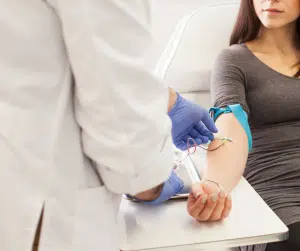Genetic Testing Procedures
Laboratory Testing for Thrombophilia
 Laboratory testing for thrombophilia typically involves a simple blood sample, collected through a standard blood draw procedure. Here’s an overview of the steps involved in the process:
Laboratory testing for thrombophilia typically involves a simple blood sample, collected through a standard blood draw procedure. Here’s an overview of the steps involved in the process:
- Sample Collection: A healthcare professional will collect a small blood sample from a vein in your arm using a needle and syringe. The area is first cleaned with an antiseptic, and a tourniquet may be applied to help locate a suitable vein.
- Sample Processing: The blood sample is then sent to a laboratory for analysis. In the lab, technicians isolate the DNA from the blood cells, which contains the genetic information needed for testing.
- Genetic Analysis: Using specialized techniques, such as polymerase chain reaction (PCR) or DNA sequencing, the lab examines specific genes associated with thrombophilia, such as the factor V Leiden mutation or the prothrombin gene mutation. These tests identify any variations or mutations in these genes that may increase the risk for blood clots.
- Interpretation of Results: Once the genetic analysis is complete, the results are interpreted by healthcare professionals. Depending on the specific gene mutations identified and other clinical factors, they can assess an individual’s risk of developing blood clots and provide personalized recommendations for treatment or preventive measures.
It’s important to note that genetic testing for thrombophilia is typically performed in specialized laboratories equipped with the necessary equipment and expertise to accurately analyze genetic samples. Results are usually available within a few weeks, and healthcare providers will discuss the implications of the findings with the individual, including any potential implications for their health and medical management.
At-Home or Direct-to-Consumer Testing for Thrombophilia

- Ordering the Test: Consumers can order a genetic testing kit online or purchase it from a retail store. The kit typically includes instructions for collecting a DNA sample, such as saliva or cheek swabs, as well as packaging materials for returning the sample to the testing company’s laboratory.
- Sample Collection: The consumer collects a DNA sample at home following the provided instructions. This usually involves swabbing the inside of the cheek or providing a saliva sample in a tube.
- Returning the Sample: The collected DNA sample is then mailed back to the testing company’s laboratory using the pre-paid shipping label or packaging provided in the kit.
- Analysis and Reporting: At the laboratory, the DNA sample undergoes analysis using various genetic testing techniques, such as DNA sequencing or genotyping. The testing company generates a report based on the analysis, which is typically accessible to the consumer through an online portal or mailed to them.
- Interpreting the Results: Consumers receive their test results, often in the form of an online report or summary. This report may include information about ancestry, genetic traits, or health-related insights, such as susceptibility to certain diseases or carrier status for genetic conditions.

Before purchasing an over-the-counter genetic testing kit, individuals should carefully consider the limitations, potential risks, and implications of the test results. Consulting with a healthcare professional or genetic counselor can help individuals make informed decisions about whether genetic testing is appropriate for their specific needs and concerns.
Learn more about direct-to-consumer genetic test kits from the National Human Genome Research Institute here.

